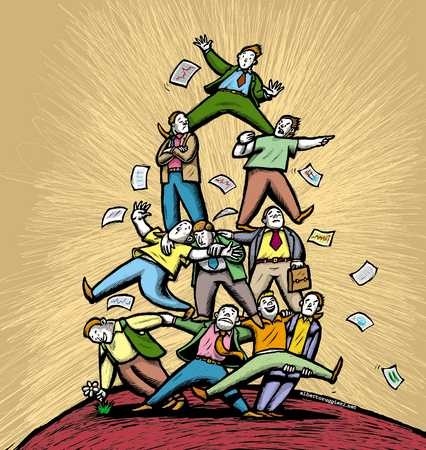Increasing the Efficiency of Business Meetings

Take any business meeting you had in the last few days. A staff gathering, an internal committee, a planning session or an executive summit. What were your thoughts?
- Great. Can’t wait to start the project.
- What exactly did Jones say…?
- Aargh! Can’t stand this waffling.
The object of a business meeting is to integrate various interdependent tasks and to make it happen information continually needs to be discussed, disseminated, and dispersed within the organisation. The convenience of a formal gathering is an ideal vehicle to deal with such efficiently. However, here are a few sobering figures:
- The average office worker attends 62 meeting per month
- Attention starts to drift after only 11 minutes
- A full 49% of time spent in meetings is considered wasted
Estimates are that in the US alone $37 Billion of time is lost every year through unproductive meetings.
Often workers formally get together for the sake of getting together. Or regular meetings fall into a routine while its original purpose has long been forgotten.
Mitchell’s law states: “Any simple problem can be made insoluble if enough meetings are held to discuss it.”
How can the inefficiency be reduced? When I lead business meetings here is what I keep in mind, distinguishing between structural and human aspects.
Structural Aspects
Clarity of purpose. The reason and purpose for convening should be made clear before the gathering, and importantly, re-stated by the leader of the meeting at the start. Is it to inform people, make certain decisions and take actions, or to brainstorm a problem? Clarity of purpose includes sticking to the agenda and not letting the discussions drift. Most important is to have a clear agenda and objectives sent out beforehand.
Invite the right people, and only the right people. Invite the right decision makers and only those that need to be there to influence the issues to be discussed. If it is purely information spreading, see what can be sent by email instead of communicated orally. Alternatively, task those present to communicate further in the organisation. If more of a brainstorming session, have a diverse crowd into the meeting – the results will be so much better.
Send action items out afterwards. Precise actions, with timelines and allocated to responsible individuals. The ideal number of people to handle a responsibility is one; no shirking and no waiting for others to do their part. Send tasks immediately after convening. Action points sent out weeks after the event is a wish-list. Hendrickson’s law of meetings says: “If a problem causes too many meetings, the meetings eventually become more important than the problem”.
Human Aspects
Social interaction. An organisation is not only a business seeking profit but also a social community. People want to relate, converse and feel part of the shared beliefs and values. Meetings are an ideal time to catch-up and strengthen social ties. Some social interaction, some humor and even a little complaining can go a long way in unifying the group and purpose. Allow for some informal bonding at the start and then get back to the formal agenda.
Informal information gathering. Attendees often do not come into contact much, if any, outside of the meeting room. As firms become more matrixed and cross-functional, employees want to know what is happening in other parts of the organisation and a formal gathering is a good place to put radars out. One way to stem this is to mention there will be opportunity for informal talk after completion of the agenda. Ironically, by which time energy has become dissipated and the urge to "get back to work" is stronger.
Status displays. Meetings rooms are the ideal place for some to strut their knowledge, show off ranking and enjoy (imagined) attention while dispensing timeless wisdom and insight. More than one person seeking undue attention and a bonfire of vanities ensues. Displays of status and a need to be competitive in all situations, must surely rank as top reasons for inefficiency. It takes confidence and skill to sway such behaviors where it contributes little to the discussion, and it seldom does. “Ok, we heard you, now let’s move on”.
Leading a business meeting is certainly not easy and it takes effort. There has been the occasional disaster when I lead, but more often than not the six points above keep the forum functioning and efficient.
What are your ideas and comments on the efficiency of business meetings?
(Source of statistics: Harvard Business Review: Guide to Making Every Meeting Matter and www.actionfraction.co.uk)
Articles from Gert Scholtz
View blog
On BeBee we have come to know Paul Walters as an eminent travel writer. From all parts of the world, ...

Sometimes I make an effort to give my children a unique experience – only to realize later I have ac ...

Here I am, trying to tempt you to travel to and visit the southern tip of Africa. Voted by many as o ...
Related professionals
You may be interested in these jobs
-
Senior Quality Assurance Technician
Found in: Talent ZA C2 - 4 days ago
BevCo Boksburg, South Africa Full timeSenior Quality Assurance Technician · Operations · Accountable for specialist outputs, as well as initiating quality standards within defined work routines and policies. · Job Purpose · To ensure effective quality assurance through the effective execution of raw materials quality ...
-

Technical Support Manager
Found in: Job Placements ZA C2 - 2 hours ago
Emporium Human Capital Roodepoort, South AfricaTechnical Support Manager (POS · Roodepoort / West Rand · R to R per month · Requirements · Qualification: Minimum GR12 but Electronics/iT Technical Diploma or BTech degree recommended. · PC HW & SW, Networks and Basic Electronics knowledge/qualifications & experience · Experien ...
-
internal sales
Found in: Talent ZA 2A C2 - 1 day ago
Worxs4u Johannesburg, South AfricaQualifications: · Grade 12 / equivalent · Experience and Requirements: · 3 or more years experience selling industrial valves (mining, petro chemical oil & gas, marine, water process, power generation and solar power valves) · Computer literate: MS Excel and Pastel · Must be bil ...



Comments
Larry Boyer
7 years ago #11
CityVP Manjit
7 years ago #10
Ken Boddie
7 years ago #9
David B. Grinberg
7 years ago #8
Gert Scholtz
7 years ago #7
Jim Cody Thank you for reading and commenting Jim. Certainly in your 35 years as manager you must have how time can be wasted in meetings. Of the four elements you mention I think a clear agenda is probably the most important and worth spending time on beforehand.
Gert Scholtz
7 years ago #6
Vincent Andrew The eleven minutes is when concentrations starts to drift - a good guideline for the time allotted to one topic. Thank you Vincent.
Gert Scholtz
7 years ago #5
Paul Walters Don't you ever run late for those meeting with yourself? :) Thanks Paul for reading.
Paul Walters
7 years ago #4
Gert Scholtz
7 years ago #3
Gert Scholtz
7 years ago #2
Mohammed Abdul Jawad
7 years ago #1